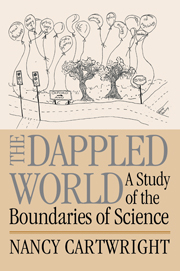Book contents
- Frontmatter
- Contents
- Acknowledgements
- Introduction
- Part I Where do laws of nature come from?
- Part II Laws and theier limits
- 4 Aristotelian natures and the modern experimental method
- 5 Causal diversity; causal stability
- 6 Ceteris paribus laws and socio-economic machines
- 7 Probability machines: chance set-ups and economic models
- Part III The boundaries of quantum and classical physics and the territories they share
- Bibliography
- Index
5 - Causal diversity; causal stability
Published online by Cambridge University Press: 05 June 2012
- Frontmatter
- Contents
- Acknowledgements
- Introduction
- Part I Where do laws of nature come from?
- Part II Laws and theier limits
- 4 Aristotelian natures and the modern experimental method
- 5 Causal diversity; causal stability
- 6 Ceteris paribus laws and socio-economic machines
- 7 Probability machines: chance set-ups and economic models
- Part III The boundaries of quantum and classical physics and the territories they share
- Bibliography
- Index
Summary
Particularism and the hunt for causal laws
This book takes its title from a poem by Gerard Manley Hopkins. Hopkins was a follower of Duns Scotus; so too am I. I stress the particular over the universal and what is plotted and pieced over what lies in one gigantic plane. This book explores the importance of what is different and separate about the sciences as opposed to what is common among them. The immediate topic of the present chapter is the Markov condition. This condition lies at the heart of a set of very well grounded and powerful techniques for causal inference developed during the last fifteen years by groups working at Carnegie Melon University with Clark Glymour and Peter Spirtes and at UCLA with Judea Pearl using directed acyclic graphs (DAGs). I think of it as a small case study in particularism. Contrary to what I take to be the hopes of many who advocate DAG-techniques, I argue that the methods are not universally applicable, and even where they work best, they are never sufficient by themselves for causal inferences that can ground policy recommendations. For sound policy, we need to know not only what causal relations hold but what will happen to them when we undertake changes. And that requires that we know something about the design of the nomological machine that generates these causal relations.
Section 2 of this chapter points out that the Markov condition is in general not satisfied by causes that act probabilistically, though it may be appropriate for many kinds of deterministic models.
- Type
- Chapter
- Information
- The Dappled WorldA Study of the Boundaries of Science, pp. 104 - 136Publisher: Cambridge University PressPrint publication year: 1999



